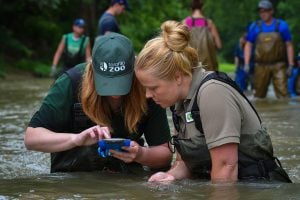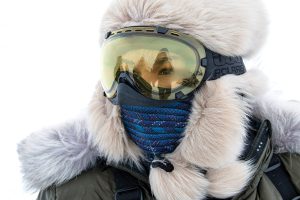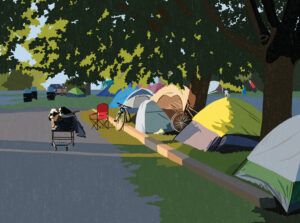
People & Culture
Kahkiihtwaam ee-pee-kiiweehtataahk: Bringing it back home again
The story of how a critically endangered Indigenous language can be saved
- 6310 words
- 26 minutes
This article is over 5 years old and may contain outdated information.
People & Culture

Based on where she conducts most of her master’s research, Adrienne White’s last name is fitting. Ellesmere Island — where she has embarked on an ambitious, overarching assessment of glaciers and ice shelves — is usually white as far as the eye can see.
“I’ve chosen the most inaccessible part of the Canadian Arctic,” she says. “The pristine nature of the island blew my mind.” But Ellesmere’s remote location doesn’t protect it from outside influence; White hopes her research will help people understand the huge and far-reaching impacts of climate change.
Over the past 15 years, northern Ellesmere Island has lost more than 50 per cent of its ice-shelf area. These giant floating ice slabs, which can form where glaciers ooze into cold ocean waters, help plug glaciers’ flow into the ocean, thereby slowing sea level rise.
With the help of a Studentship in Northern Geography research grant from The Royal Canadian Geographical Society, White is using a variety of methods (including remote sensing and field research) to look for changes in Ellesmere’s glaciers, ice shelves and surrounding sea ice. She wants to know if changes in one type of ice can trigger a domino effect, causing instability across remaining ice types. For example, does weakening sea ice lead to ice shelf collapse? Does that in turn quicken the disappearance of glaciers?
Although White has two more years to complete her study, she predicts widespread retreat of the island’s ice coverage. “I feel really connected to that area,” she says, “but eventually, the ice shelves will all be gone.”
Maxwell Studentship Recipient
TREVOR WIDEMAN, QUEEN’S UNIVERSITY
Looking at Vancouver’s Downtown Eastside as a case study, Trevor Wideman will examine political “toponymy” (the naming and renaming of places) by reviewing the theory of place naming and how names influence perceptions, studying the practice of renaming to revitalize and critiquing policy.
Independent Research Grant Recipient
SALMON COAST
Data collected by Salmon Coast researchers will help larger future initiatives implement a humpback whale recovery strategy in the North Pacific. During the summer, the researchers completed surveys circumnavigating Gilford Island, B.C., taking humpback identification photos, marking locations of potential threats and collecting sighting data of other marine mammals. The information will also be used for outreach and awareness.
Graduate Research Scholarship
JEANETTE CARNEY, MEMORIAL UNIVERSITY
Jeanette Carney will research the history of Asbestos Hill mine in Nunavik, northern Quebec, and its impacts on Inuit in the region. Carney aims to add to knowledge about mining impacts in Nunavik and on Inuit across the North, as well as provide historical context to contemporary development issues in the region.
Graduate Research Scholarship
FRANCES STEWART, UNIVERSITY OF VICTORIA
To understand the value of Alberta’s Cooking Lake moraine, Frances Stewart will document wildlife in the mixed-use agricultural landscape. The research, which will quantify the moraine’s ecological contribution to maintain mammalian biodiversity, could serve as a model for Canadian human-wildlife coexistence studies.
Are you passionate about Canadian geography?
You can support Canadian Geographic in 3 ways:

People & Culture
The story of how a critically endangered Indigenous language can be saved

Environment
A new study finds zoos and aquariums in Canada are publishing more peer-reviewed research, but there is still more to be done

Science & Tech
The Canadian High Arctic Research Station is set to open in Cambridge Bay, Nunavut, later this year. How will it affect our understanding and appreciation of the North and the rapid change occurring there?

People & Culture
For unhoused residents and those who help them, the pandemic was another wave in a rising tide of challenges